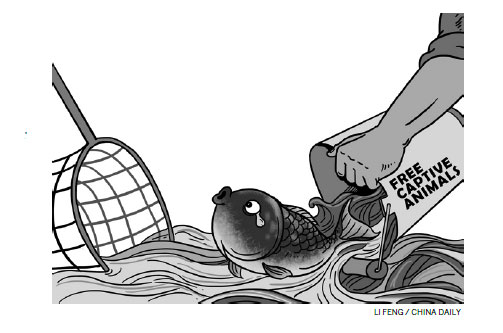The irony of releasing animals in the wild for salvation
Updated: 2016-04-16 09:01
By Li Yang(China Daily)
|
||||||||

Some believers in Buddhism released about 300 arctic foxes and minks in the mountains north of Beijing late last month. Soon a farmer reported to local officials that foxes had killed three of his chickens, and local forestry police started a hunt for the animals. By April 13, police had found about 100 foxes, of which more than 40 had starved to death.
The practice of setting animals free is not new. Buddhists have been releasing animals in the wild for ages, apparently to save them from slaughter or being "exploited" by their human masters. But even if police found the people who set the animals free, there is no law to hold them accountable for the troubles they have caused, albeit wittingly, to the local residents.
For Buddhists, setting animals free is regarded as a means of salvation (or an act of penance). If it is done on an auspicious day according to the Buddhist calendar, the deed becomes more virtuous, which in their belief can strengthen a person's chances of going to heaven after death, or help cleanse his/her sins. Although there are many schools in Buddhism, releasing animals from bondage or captivity is a common practice among all.
Fish, turtles, birds, snakes and foxes are the most popular choice of animals for the purpose, as they are easily available in captivity, or as pets. But the people who release such animals are usually not bothered about whether they can survive in the wild. Unfortunately, most animals raised on farms, or in homes, cannot adapt to the harsh conditions in the wild. They cannot hunt or protect themselves against their natural predators. If that is the case, don't Buddhists, by releasing such animals in the wild, push them closer to death?
Worse, such people sometimes introduce invasive species into the wild. And as is their wont, invasive species pose a threat to indigenous species. For example, snapping turtles and red-eared sliders, turtles found in the natural state only in North and Central America and which have no natural predators in China, have broken the ecological balance in some parts of China after being released in the wild by people seeking salvation.
- Global health entering new era: WHO chief
- Brazil's planning minister steps aside after recordings revelation
- Vietnam, US adopt joint statement on advancing comprehensive partnership
- European border closures 'inhumane': UN refugee agency
- Japan's foreign minister calls A-bombings extremely regrettable
- Fukushima impact unprecedented for oceans: US expert

 Stars of Lijiang River: Elderly brothers with white beards
Stars of Lijiang River: Elderly brothers with white beards
 Wealthy Chinese children paying money to learn British manners
Wealthy Chinese children paying money to learn British manners
 Military-style wedding: Fighter jets, grooms in dashing uniforms
Military-style wedding: Fighter jets, grooms in dashing uniforms
 Striking photos around the world: May 16 - May 22
Striking photos around the world: May 16 - May 22
 Robots help elderly in nursing home in east China
Robots help elderly in nursing home in east China
 Hanging in the air: Chongqing holds rescue drill
Hanging in the air: Chongqing holds rescue drill
 2.1-ton tofu finishes in two hours in central China
2.1-ton tofu finishes in two hours in central China
 Six things you may not know about Grain Buds
Six things you may not know about Grain Buds
Most Viewed
Editor's Picks

|

|

|

|

|

|
Today's Top News
Liang avoids jail in shooting death
China's finance minister addresses ratings downgrade
Duke alumni visit Chinese Embassy
Marriott unlikely to top Anbang offer for Starwood: Observers
Chinese biopharma debuts on Nasdaq
What ends Jeb Bush's White House hopes
Investigation for Nicolas's campaign
Will US-ASEAN meeting be good for region?
US Weekly

|

|








